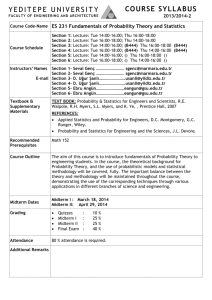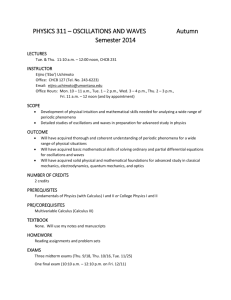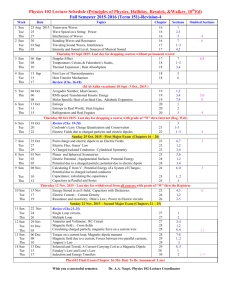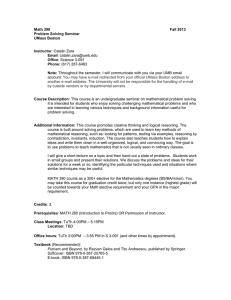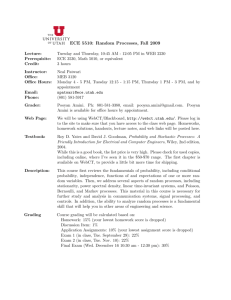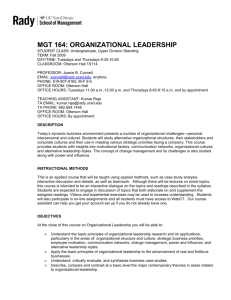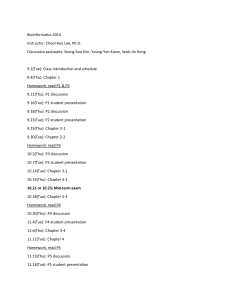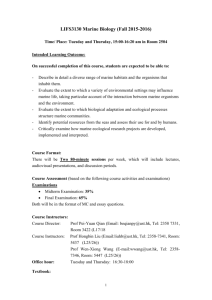Introduction to Human Communication & Culture Fall 2012
advertisement
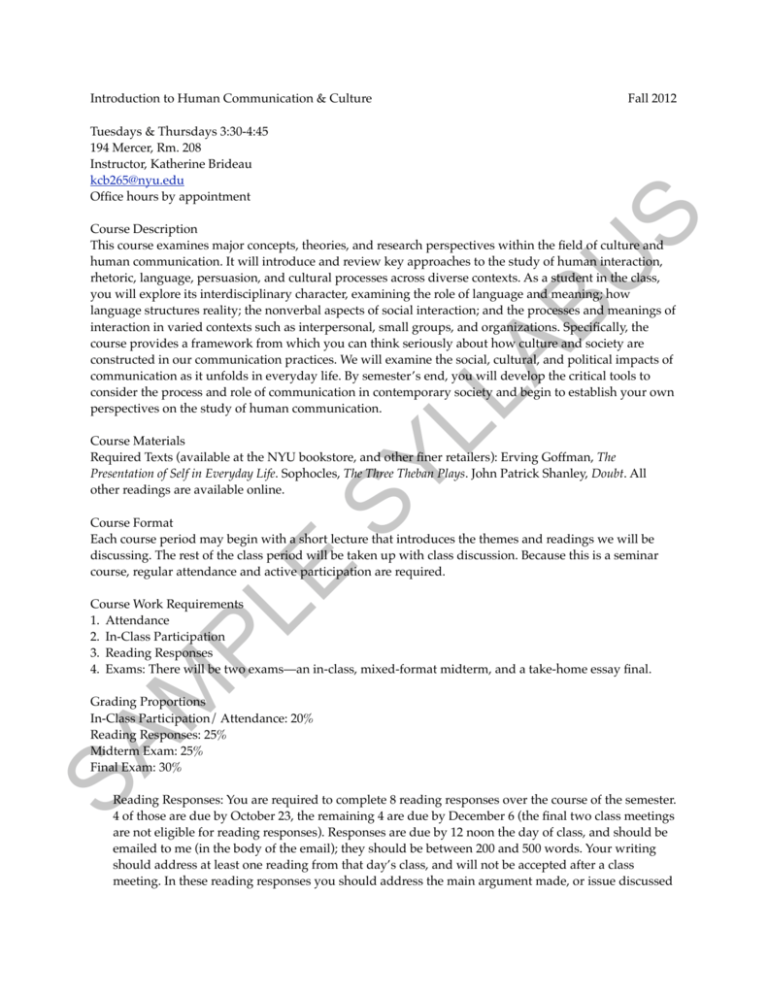
Introduction to Human Communication & Culture! ! ! ! ! Fall 2012 S Tuesdays & Thursdays 3:30-4:45 194 Mercer, Rm. 208 Instructor, Katherine Brideau kcb265@nyu.edu Office hours by appointment LL AB U Course Description This course examines major concepts, theories, and research perspectives within the field of culture and human communication. It will introduce and review key approaches to the study of human interaction, rhetoric, language, persuasion, and cultural processes across diverse contexts. As a student in the class, you will explore its interdisciplinary character, examining the role of language and meaning; how language structures reality; the nonverbal aspects of social interaction; and the processes and meanings of interaction in varied contexts such as interpersonal, small groups, and organizations. Specifically, the course provides a framework from which you can think seriously about how culture and society are constructed in our communication practices. We will examine the social, cultural, and political impacts of communication as it unfolds in everyday life. By semester’s end, you will develop the critical tools to consider the process and role of communication in contemporary society and begin to establish your own perspectives on the study of human communication. SY Course Materials Required Texts (available at the NYU bookstore, and other finer retailers): Erving Goffman, The Presentation of Self in Everyday Life. Sophocles, The Three Theban Plays. John Patrick Shanley, Doubt. All other readings are available online. E Course Format Each course period may begin with a short lecture that introduces the themes and readings we will be discussing. The rest of the class period will be taken up with class discussion. Because this is a seminar course, regular attendance and active participation are required. M PL Course Work Requirements 1. Attendance 2. In-Class Participation 3. Reading Responses 4. Exams: There will be two exams—an in-class, mixed-format midterm, and a take-home essay final. SA Grading Proportions In-Class Participation/ Attendance: 20% Reading Responses: 25% Midterm Exam: 25% Final Exam: 30% Reading Responses: You are required to complete 8 reading responses over the course of the semester. 4 of those are due by October 23, the remaining 4 are due by December 6 (the final two class meetings are not eligible for reading responses). Responses are due by 12 noon the day of class, and should be emailed to me (in the body of the email); they should be between 200 and 500 words. Your writing should address at least one reading from that day’s class, and will not be accepted after a class meeting. In these reading responses you should address the main argument made, or issue discussed in a given reading. Are there aspects you disagree with or don’t understand? Points made in the reading that you find interesting or compelling? Does the reading raise any further questions for you —issues the author could have discussed but didn’t? Although these responses are short, they should be written as scholarly texts. Try to avoid anecdotes, and simple summarization. Think critically about the text you are responding to. Letter grades will not be assigned to these readings, but feedback will be given periodically. AB U S Exams: The midterm exam will be administered in class on October 9, and will be a combination of multiple choice and short response questions. The final exam be handed out on the final day of class, and will consist of 3 essay questions of which you will choose 2 to complete. Each essay will be 5-7 pages long, and emailed to me by a date and time to be determined. ****** LL Course Schedule Tue. Sept. 4—Introduction Thu. Sept. 6—Culture & Communication James Carey, “A Cultural Approach to Communication” Raymond Williams, “Culture” from Keywords SY Tue. Sept. 11—Community & Knowledge Clifford Geertz, “Common Sense as a Cultural System” John Kenneth Galbraith, “The Concept of the Conventional Wisdom” Thu. Sept. 13—The Idea of Communication John Durham Peters, “The Problem of Communication” PL E Tue. Sept. 18—Language & The Mind John Colapinto, “The Interpreter” Steven Pinker, “Mentalese” Thu. Sept. 20—The Power of Language! Friedrich Nietzsche, “On Truth and Lies in a Nonmoral Sense” Robert B. Moore, “Racist Stereotyping in the English Language” SA M Tue. Sept. 25—Speech & Naming J.L. Austin, selection from Doing Things With Words Walter Benjamin, “On Language as Such and the Language of Man” Thu. Sept. 27—Metaphor Lakoff & Johnson, selection from Metaphors We Live By Susan Sontag, selection from Illness as Metaphor Tue. Oct. 2—Rhetoric Listen to Fresh Air interview with Frank Luntz: ! http://www.npr.org/templates/story/story.php?storyId=6761960 Roland Barthes, “Rhetoric of the Image” * Additional Recommendation: George Orwell, “Politics and the English Language.” Thu. Oct. 4—Non-Verbal Communication: Music Kathleen Marie Higgins, selections from The Music Between Us Tue. Oct. 9—In-Class Midterm Exam Tue. Oct. 16—Fall Break—No Class LL Thu. Oct. 18—Non-Verbal Communication: Design Vilém Flusser, “About the Word Design” Victor Papanek, “What Is Design?” Watch Objectified (Gary Hustwit, 2009): 76 min. AB U S Thu. Oct. 11— Non-Verbal Communication: Style Kobena Mercer, “Black Hair/ Style Politics” Ayana D. Byrd & Lori L. Tharps, selection from Hair Story: Untangling the Roots of Black Hair in America. * Additional Recommendation: Good Hair (Jeff Stilson, 2009): 96 min. SY Tue. Oct. 23—Space, Communication & Culture Jane Jacobs, selection from The Death and Life of Cities Visit the High Line. Directions to park at: http://www.thehighline.org/about/park-information E Thu. Oct. 25—Time, Communication & Culture Edward Hall, “How Many Kinds of Time?” Jeremy Rifkin, “The New Nanosecond Culture” PL Tue. Oct. 30—Self-Presentation Erving Goffman, Presentation of the Self: Introduction & Chapter 3 M Thu. Nov. 1—Race & Stereotype Malcolm Gladwell, “The Warren Harding Error” visit website: https://implicit.harvard.edu/implicit/ Selection from History of White People SA Tue. Nov. 6—Disability Erving Goffman, selections from Stigma Simi Linton, “Reassigning Meaning” Thu. Nov. 8—Gender Carol Clover, “Her Body, Himself: Gender in the Slasher Film” * Additional Recommendation: Texas Chainsaw Massacre (Tobe Hooper, 1974): 84 min. Tue. Nov. 13—Sexuality Michael Warner, selection from The Trouble With Normal Tue. Nov. 20—Group Communication Huxman & Bruce, “Toward a Generic Dynamic Framework of Apologia” Carol Cohn, “Sex & Death in the Rational World of Defense Intellectuals” AB U Thu. Nov. 22—Thanksgiving—No Class S Thu. Nov. 15—Capital, Class & Cultural Products Dick Hebdige, “Subculture: the Meaning of Style” Watch “Land of the Free, Home of the Poor” (PBS Newshour): 11:46 min. ! http://www.pbs.org/newshour/bb/business/july-dec11/makingsense_08-16.html Tue. Nov. 27—Technologically-Mediated Human Communication Lisa Nakamura, “Menu-Driven Identities” Watch Sherry Turkle, “Connected But Alone?” (TED talk): 19:48 min. http://www.ted.com/talks/lang/en/sherry_turkle_alone_together.html LL Thu. Nov. 29—Technologically-Mediated Human Culture Eugene Thacker, selection from Biomedia Watch “Biotech Revolution” (Michio Kaku & BBC): 58 min. http://www.youtube.com/watch?v=yU3YrL1zxns SY Tue. Dec. 4—Machine Communication Norbert Wiener, selection from Human Use of Human Beings: Cybernetics and Society? Stephen Baker, selection from Final Jeopardy: Man vs. Machine and the Quest to Know Everything E Thu. Dec. 6—Public & Private Communication Neil Postman, “Now...This” John Durham Peters, “Dialogue and Eros” SA M PL Tue. Dec. 11—Greek Tragedy Sophocles, Antigone “chorus” and “tragedy” from Bedford Glossary Thu. Dec. 13—Modern Parable John Patrick Shanley, Doubt “parable” and “allegory” from Bedford Glossary

